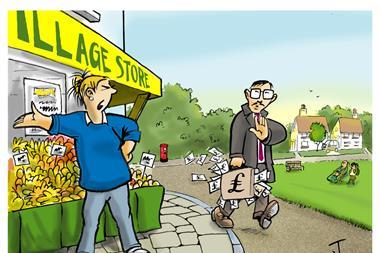The Department for Communities and Local Government claims it is planning to change a ratings system anomaly that has put potentially hundreds of rural convenience stores at a disadvantage to urban operators.
The anomaly has occurred because of the introduction of piecemeal relief schemes over many years and an element of discretion councils have. Stores in rural areas are required to apply for Rural Rate Relief rather than Small Business Rate Relief (SBRR), and the former has a discretionary element, whereas the SBRR is mandatory.
Under the rural scheme, convenience stores with a rateable value of up to £8,500 – or up to £12,500 if a petrol station – in a rural area with a population below 3,000 can get Rural Rate Relief if they are the only village shop or post office.
Only 50% of the relief is mandatory, however, and councils have the choice whether to top it up to 100%. They also have discretion to give relief to other rural retail businesses of up to 100% for properties with a rateable value under £16,500.
The disadvantage to rural convenience stores becomes even more marked from next April when small businesses that occupy property with a rateable value of £12,000 or less will pay no business rates under SBRR – up from £6,000 or less currently.
The Rural Shops Alliance (RSA) said the problem occurred because businesses that qualify for rural rate relief must apply for that scheme rather than SBRR.
Ken Parsons, RSA chief executive, said this did not matter as much in the past because most rating authorities provided the discretionary top-up to rural rate relief. But some businesses were no longer getting any or all of the discretionary component because of the pressure on council budgets.
“It’s crazy, a quirk of the system,” Parsons said. “This means that at present they are being penalised compared with businesses in larger settlements unable to claim the rural relief – the complete opposite of government’s intentions.”
David Scott, from Bootle Stores and Post Office in Cumbria, said: “I’m at the end of my tether. I’m at loggerheads with the council. This must be happening to hundreds of businesses. I’m getting nowhere.”
Fiona Rooney, interim resources and strategic commissioning director at Copeland Borough Council, where Bottle Stores and Post Office is located, said: “Our current policy regarding the top-up is not straightforward, but we are looking at all possible options to support Mr Scott and we’re hopeful we’ll find a positive solution.
“We are also reviewing the policy itself to make it clear and easy to implement – we’re keen to help as many rural businesses as possible through the top-up scheme. We’ll do this at the first opportunity, which is our upcoming budget…Hopefully we will then incorporate the change for next year and rural businesses will be able to take advantage of it.”
Marcus Jones, minister for local government, who replied to Robert Goodwill MP (Con: Scarborough and Whitby) after he raised the issue with the minister on behalf of Sally Gibbons, of Lealholm Village Shop, North Yorkshire, wrote: “Primary legislation dictates that, where ratepayers are eligible for both, they must receive Rural Rate Relief rather than SBRR.”
He added, however: “We will be looking to amend that now that SBRR has been made more generous.”
He went on to say councils could meanwhile use their discretionary powers to top up ratepayers receiving Rural Rate Relief.
The RSA, however, said it doubted the government had “the will to do anything about it”.
Meanwhile, the Association of Convenience Stores has welcomed the Welsh Government’s approach to fund Transitional Relief for retailers who will be adversely affected as a result of the revaluation.
ACS chief executive James Lowman said: “The relief scheme will offer targeted relief to those likely to be most impacted by the revaluation, giving retailers three years to plan for and adjust ahead of their full increased liability. We commend the Welsh Government for wholly funding this scheme, however more needs to be done to support retailers in Wales who are not eligible for Small Business Rate Relief.”
ACS’ Voice of Local Shops Survey shows that 40% of Welsh retailers are not currently eligible for Small Business Rate Relief.




















No comments yet